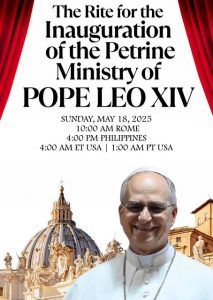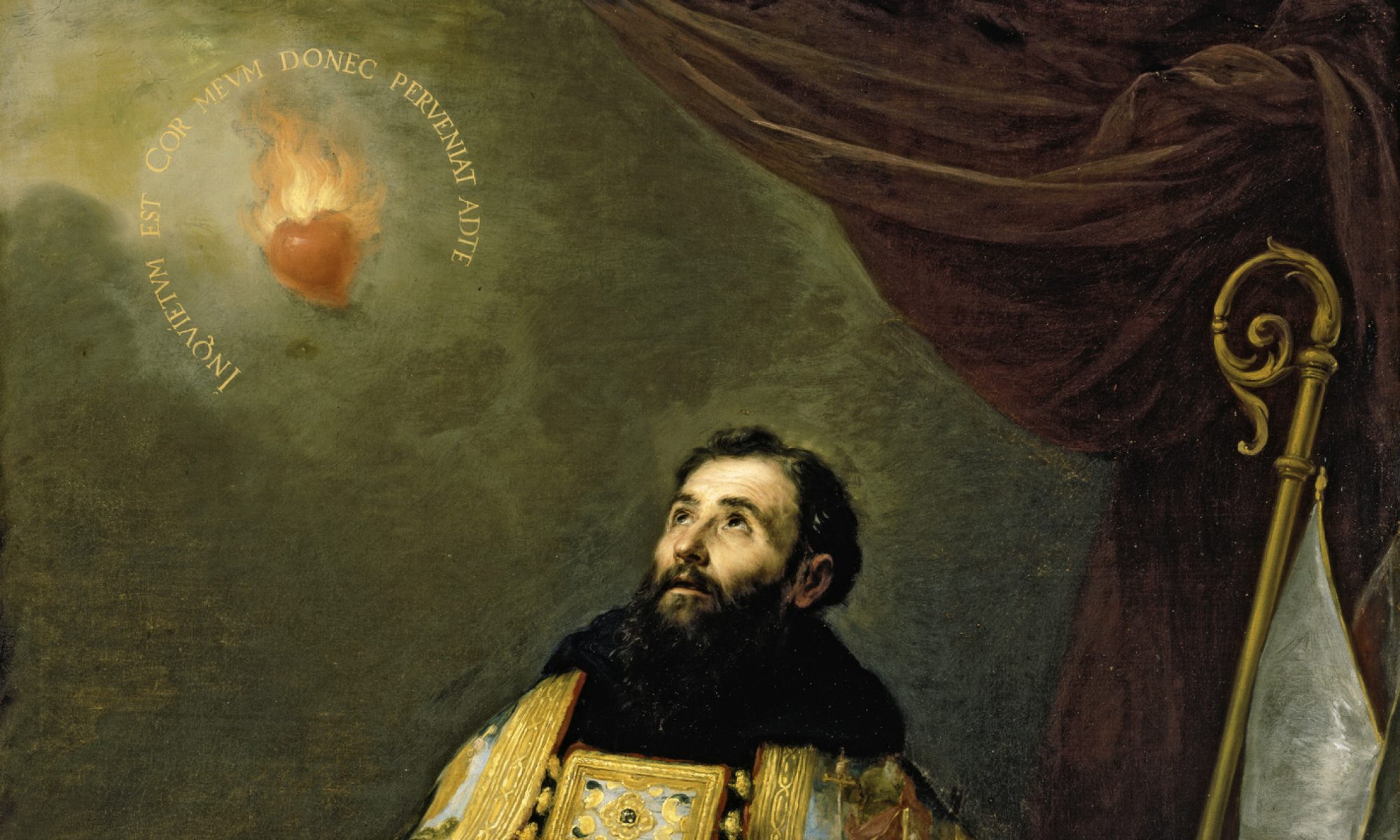Today is the 5th Sunday of Easter. We are happy too that Pope Leo XIV inauguration occupying the seat of St. Peter and as the 267th Pontiff of the Catholic Church today. The first Augustinian Pope after 800 years. Having a new Pope, the Vicar of Christ on earth is a blessing. The Holy Father will tend and shepherd us for the coming years. It is not about being a conservative or progressive Pope, but what is important is to usher us to the true doctrine and orthodoxy of Christ’s teaching in this crucial period of modernity and secularism. We need to pray for our Holy Father and for the continuous proclamation of the gospel to all peoples.
The 1st reading today guide us to learn from the experience of the early Christians, in particular Paul and Barnabas, who devout their lives for Jesus, our Lord and Savior. They were called missionaries as both of them experienced a call of the Spirit in the Books of the Acts. Their missionary endeavors led the foundation for new Christian communities, but at the same time it revealed the many challenges and hostilities of certain Jewish communities. As it was written, “It is necessary for us to undergo many hardships to enter the Kingdom of God.” (v.22) However, both Paul and Barnabas did outstanding sacrifices in achieving successful expansion for new communities of believers. Their hard work was due to their trust of God’s love in preaching the good news and their fidelity to their ministry no matter what the circumstances entail. I believe that the Holy Spirit has been poured out upon the Apostles to proclaim the gospel to the four corners of the world despite their human instrumentality and weakness.
The 2nd reading, taken from the book of Revelation, focuses on the new heaven and the new earth. This is the hope for a new beginning transformed by Jesus’ power, through which the world will never be the same again.
The gospel, taken from the evangelist John, narrates to us about the event that happened during the Last Supper. Jesus says that their love for each other is how others know that they are His disciples. The Lord always supported His disciples by reminding them to persevere in faith, which can be very challenging at times. We all as disciples need to be reminded of the Lord’s commandment: love one another as I have loved you. Listening for and appreciating the love of God allows us to live the commandment to love others. Let us reflect on salient points in today’s gospel pericope:
First, Jesus says, “Now is the Son of Man glorified, and God is glorified in Him.” In John’s theology, “glory” has something to do with the more complete revelation about Jesus. The highest manifestation of this glory is Jesus’ abandonment of on the Cross. On the Cross, we see the depth of God’s love glorified at this humiliating throne because of His perfect obedience. It has been revealed in all His glory, upon the Cross.
According to John, we’ll spend the next four chapters on his gospel making sure his message is stated as clearly as possible. Thus, by our mutual reverence, and love the “glory” of God would draw and attract new members of the Church. For “They will know we are Christians by our love”.
Second, Jesus says, “My children, I will be with you only a little while longer.” Jesus is speaking about His life handing it over to us before He handed His life over to death. He is reminding us that “a little while longer,” means that his temporal last hours with His friends, whom He regards as “My children,” is a reminder that we ate covenanted to become a sacrament of His creative love, which speaks a real presence on His behalf.
Third, Jesus says, “I give my new commandment: love one another.” St. John emphasized Jesus’ way of giving “a new commandment.” According to the Book of Genesis, the first commandment was creation, “Let there be……..” Light, order, life and fertility were results of a divine creative command. The Fall resulted in darkness, disorder, living outside the original design and context, and fertility was to be experienced in pain.
In the new covenant, Jesus commands a “new” kind of creational love which is meant to bring back light, reverence and respect for what is so called a relational exchange of interiors.
We, as His disciples are commanded to love each other into more and more like Jesus had done with the apostles. Jesus is giving us this new commandment much as we can handle. Now, Jesus is urging us to love beyond or outside our circle, and to share gifts that has been prepared and given to others as well.
In the spirit of Easter, may we ask ourselves “How could someone identify me as a Christian based on the love that I show?” What does it mean for us today to love one another like Jesus loved us? So my prayer with today’s readings calls me to discipleship and to a renewed commitment to follow the commandment to love one another.
God bless you.
Fr. Arlon, osa
—————-
El Dictado del Corazón
Quinto Domingo de Pascua, Año C
- Hechos 14, 21-27
- Salmo 144, 8-9. 10-11. 12-13
- Apocalipsis 21, 1-5a
- Juan 13, 31-33a. 34-35
Hoy, al celebrar el Quinto Domingo de Pascua, nos alegramos por la bendición de tener un nuevo Papa. No se trata de si es conservador o progresista; lo que realmente importa es que nos guíe con fidelidad a la verdadera doctrina y a la ortodoxia de las enseñanzas de Cristo. En este tiempo crítico, marcado por la modernidad y el secularismo, estamos llamados a orar con fervor por la continua proclamación del Evangelio a todos los pueblos.
Las lecturas de hoy nos guían por la experiencia de la Iglesia primitiva, en particular, los esfuerzos misioneros de los santos Pablo y Bernabé. Su entrega al Señor Jesús dio lugar a la formación de nuevas comunidades cristianas, a pesar de una fuerte oposición y muchas dificultades. Como escuchamos en los Hechos: “Es necesario pasar por muchas tribulaciones para entrar en el Reino de Dios” (Hechos 14, 22). Sin embargo, Pablo y Bernabé se mantuvieron firmes, confiando en el amor de Dios y permaneciendo fieles a su misión, sin importar el costo. Su perseverancia es testimonio del poder del Espíritu Santo, quien actúa incluso a través de nuestra debilidad humana para anunciar el Evangelio hasta los confines de la tierra.
La segunda lectura, del Libro del Apocalipsis, nos ofrece una visión de esperanza: un cielo nuevo y una tierra nueva. Esta es la promesa de un mundo transformado por el poder de Cristo resucitado. En Él, todo se hace nuevo, y el mundo ya no será igual.
El Evangelio de hoy, según san Juan, nos lleva al Cenáculo, la noche de la Última Cena. Jesús comparte una verdad profunda: “En esto reconocerán todos que son mis discípulos: si se aman los unos a los otros.” Les recuerda a sus discípulos que deben perseverar en la fe y el amor, incluso en los momentos difíciles. Nosotros también estamos llamados a vivir este mandamiento: amarnos unos a otros como Él nos ha amado. Solo cuando estamos arraigados en el amor de Dios podemos amar verdaderamente a los demás.
Reflexionemos sobre tres puntos claves del Evangelio:
Primero, Jesús dice: “Ahora ha sido glorificado el Hijo del Hombre, y Dios ha sido glorificado en Él.”
En el Evangelio de Juan, “gloria” se refiere a la plena revelación de Jesús, especialmente a través de su Pasión y muerte. La Cruz se convierte en su trono, un lugar de sufrimiento, sí, pero también de obediencia perfecta y amor divino. Jesús es glorificado en su entrega total, y a través de Él, el amor de Dios se hace visible al mundo. Este amor atrae a otros a la Iglesia. Como dice el himno: “Sabrán que somos cristianos por nuestro amor.”
Segundo, Jesús les dice: “Hijitos, todavía estaré con ustedes un poco más.”
Aquí, Él habla con ternura a sus discípulos, preparándolos para su partida. Les está confiando su misión a ellos y a nosotros. Estamos llamados a ser sacramentos de su amor, signos visibles de su presencia en el mundo. Su ausencia física se convierte en una invitación para que nosotros hagamos tangible su amor por medio de nuestras vidas.
Tercero, Jesús dice: “Les doy un mandamiento nuevo: que se amen los unos a los otros.”
Este “mandamiento nuevo” no es simplemente una repetición de lo anterior, es una nueva creación. En el Génesis, el mandato de Dios dio origen a la luz, el orden y la vida. Después del pecado original, entraron la oscuridad y el desorden en el mundo. Ahora, en la Nueva Alianza, Jesús ofrece un mandamiento que restaura la creación a través del amor. Es un amor que ilumina las tinieblas, honra la dignidad del otro y nos conduce a una relación más profunda. Los discípulos no solo deben amarse entre ellos, sino extender ese amor a todos, como lo hizo Cristo.
En este espíritu de Pascua, preguntémonos: ¿Puede alguien reconocerme como cristiano por el amor que demuestro? ¿Qué significa hoy, verdaderamente, amar como Jesús nos ha amado?
Que las lecturas de hoy renueven nuestro compromiso con el discipulado. Que nos esforcemos por seguir el mandamiento de amor de Cristo, no solo de palabra, sino con hechos.
Que Dios los bendiga a todos.
P. Arlon, OSA

